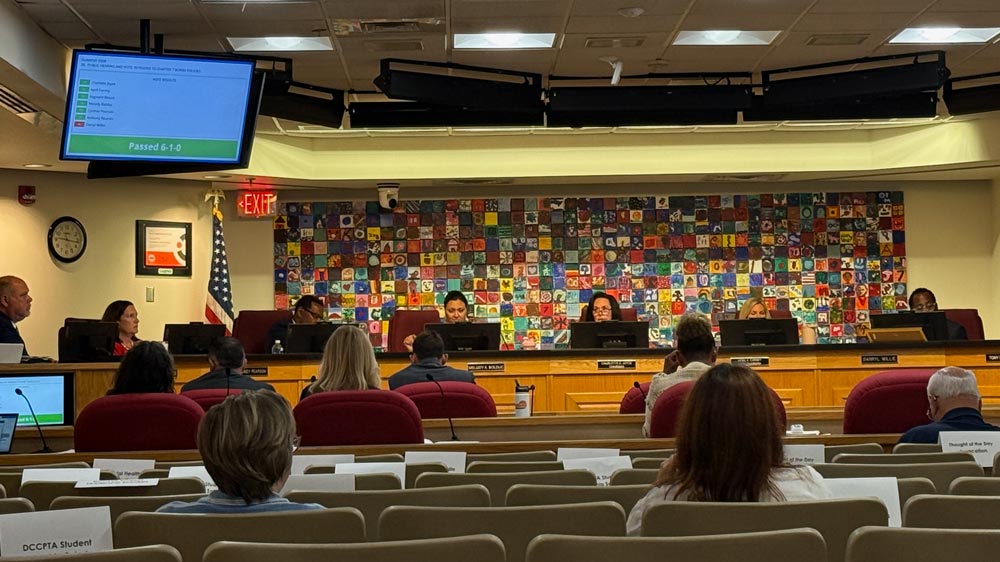The Duval County School Board on Tuesday approved changes to the district’s sex education curriculum and its rules on employee conduct, including limiting one-to-one communication with students. The board also removed diversity objectives from its contractor policy, in accordance with a disputed federal executive order.
Sex ed remains opt-out
Currently, all students in grades 6-12 receive sex ed instruction, and parents may opt kids out. Months ago, the school board considered changing the policy to require parents to opt their children into sex ed. The final version adopted Tuesday kept the lessons as opt-out and added a compromise: Schools will be able to split middle-school students by gender for sex ed lessons — something the previous policy did not expressly prohibit.
“We asked for a few things. One was, ‘OK, we could be OK with having only an opt-out if communication was very clear in a multitude of ways,” District 7 rep Melody Bolduc said. “And…if it was separated by genders, where girls could ask questions in the presence of girls, boys asking questions in the presence of boys, that they would feel more comfortable asking the questions that they have.”
Darryl Willie was the sole no vote against the change.
“I think we’ve done something where we’ve actually created something we didn’t need to create,” Willie said.
Bolduc and others said recent guidance from the state required the board to make the changes.
“As a sworn constitutional officer, I’m bound to uphold state and federal law — both of which recognize male and female based on biological sex,” Bolduc said.
Superintendent Chris Bernier said his staff was looking at what other districts have done regarding gender-separated sex ed and were waiting to see if the policy passed before crafting specific procedures.
Teacher-student communication limited
The board also unanimously voted to require district employees to “maintain professionalism” on and off duty, including in the content they post online. The new policy requires employees to communicate with students only though the district’s approved tools, and encourages them to not be alone with students, whenever possible. Earlier iterations of the proposed changes instructed employees to refrain from posting to social media content that might damage the district’s reputation, but the final version refers instead to a state policy on professional conduct.
Public commenters who spoke Tuesday questioned why the board did not include themselves among those bound by the new social media standards. Last year, newly elected District 1 representative Tony Ricardo faced criticism for his public Facebook posts, which included everything from anti-LGBTQ memes to misinformation about the weather. On Tuesday, more than one commenter spoke directly to him, saying his own use of social media would violate the policy for which he was about to vote.
Board attorney Ray Poole advised the board that they don’t have legal standing to “police” each other because no one outranks anyone. The recourse for the public would be to vote them out, he said, or take a complaint to the governor or state ethics commission.
Removing DEI mentions
Finally, the board approved changes to a policy about awarding contracts to small businesses to remove all mention of minority- or women-owned businesses. Citing a need to comply with President Trump’s recent executive order requiring government entities to remove diversity, equity and inclusion programs, the board voted 6-1. Willie was again the dissenter.
“Yeah, I don’t like this one at all. For various reasons,” Willie said.
The district had promised the community it would use money from the half-penny sales tax to support women- and minority-owned businesses, he said, and though he trusts district staff to “adjust to the moment,” he said removing the language from the policy might keep some businesses from competing for contracts.
Willie — and several public commenters — noted that parts of the executive order are being challenged in court. Willie asked Poole if the district would be penalized for non-compliance by waiting until those legal challenges are resolved. (Duval Schools puts its federal funding at risk by not following the order.)
Poole, the board’s attorney, said existing legal precedent supports the executive order. And, he said, recent legislation passed in Tallahassee also supports the premise of the order.
“In the meantime, I think — and trying to predict what the administration would do — I think the administration would view us as being noncompliant at this point,” Poole said.







